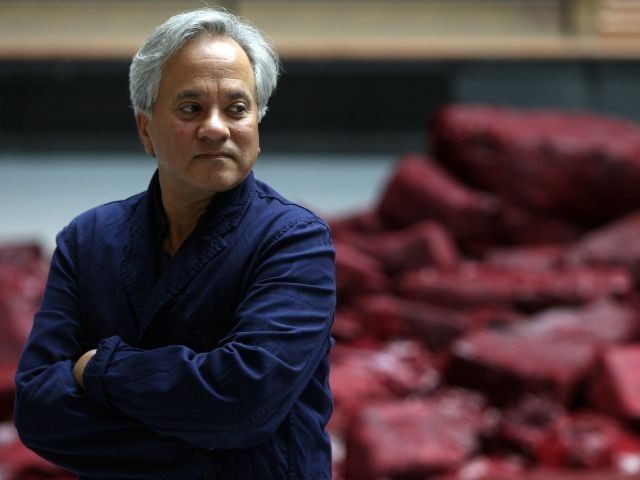One hundred and ten celebrities with a combined net worth running into the billions have together taken out a full page advert in The Guardian calling on the British government to take in more migrants. Invoking the memory of Aylan Kurdi, the toddler who drowned in the Mediterranean last week, the group accuse the government of doing “too little over too long.”
Sir Anish Kapoor, who helped organise the advert has gone further, accusing the government of “fascism” for promising to take in 20,000 Syrians over the next five years. Kapoor is the seventh richest artist in the world, worth an estimated $85 million.
“I was motivated by a sense of outrage against our doctrinaire government, which had been so grossly unjust,” he told The Guardian.
“20,000 people over five years, that’s 4,000 people now, in this immediate crisis? When we’re looking at who knows how many thousands of people arriving in the next month? It’s pathetic.
“Britain is identifying itself with the fascists, and we are not that. This is a new kind of fascism, a fascism that is polite. Cameron comes across as a nice guy, but he’s more rightwing than anything we’ve known.”
According to the paper, the advert was the brain-child of Indian-born British sculptor Kapoor, director Joe Wright and his wife musician Anoushka Shankar, Canongate publisher Jamie Byng and Adam Broomberg, a South African artist based in London.
Signatories include Hollywood actors Jude Law, Keira Knightley, Sir Michael Caine and his wife Lady Shakira, Benedict Cumberbatch and Vanessa Redgrave; musicians Damon Albarn, Eric Clapton, Paloma Faith and David Rowntree; writers Will Self, Philip Pullman, and Nick Hornby; and a number of others including Jamie Oliver and Shami Chakrabarti.
Kapoor went on to praise Germany for opening its doors wide open to hundreds of thousands of migrants, saying: “Germany has shown incredible nous. In welcoming refugees in huge numbers, they are welcoming the elite, the teachers, the engineers, the people who decide to pick up their families and get out of there – something that demands huge inventiveness.
“Germany is welcoming a whole workforce of Syria’s intelligentsia. Why are we not? Why are we so morally impoverished that we can’t do it?”
Last week a Patriarch in the Syrian church wrote an impassioned letter to the young people of Syria, warning them that their desertion will spell the end of Christianity in that country and imploring them not to leave.
“I implore you to remain, arming yourselves with resolution, patience, endurance, strength and good courage,” he wrote.
In its coverage of the advert the Guardian misquotes the group recording. It says: “Whilst we appreciate the UK government’s recent commitments on refugee resettlement, we worry that this is too little, too late.” This mild and conciliatory quote does not appear in the original.
The full text of the advert reads as follows:
“We, like many of our fellow citizens, have been deeply moved by the scenes of suffering from Kos to Budapest, Lampedusa to Calais, as desperate families seek sanctuary on European shores. We want to welcome refugees to our country. The British public is making its voice heard and is prepared to play a leading role in helping people rebuild their lives here.
“We have a moral responsibility to offer safe haven to people fleeing war and persecution; a responsibility that should be shared with our European neighbours and not simply shouldered by the countries closest to the turbulence driving people from their homes. The Government’s recent commitment on refugee resettlement is too little over too long. History has shown that Britain can move quickly in times of global emergency. During the First World War this country welcomed half a million Belgian refugees – on some days as many as 16,000 arrivals were supported by local organising committees.
“In 2015, our response to Europe’s biggest refugee movement since the Second World War needs to match the scale of need. Wars, conflict and persecution have forced more people than at any other time since records began to flee their homes and seek refuge elsewhere. Every day last year on average 42,500 people became refugees, asylum seekers, or were displaced within their own country. We believe that the British government can do better, and must do better in its proposals to resettle people seeking safety and peace. Last week Syrian refugee Abdullah Kurdi asked that the death of his young sons be a ‘wake up call to the world’ after they drowned trying to reach Europe in the hope of a safer life. In their name, and that of the millions of others displaced from their homes, we urge that the UK government wake up to the urgency of the current crisis and work with its European counterparts to offer immediate humanitarian help and agree long-term solutions to refugee resettlement.”
This not the only refugee initiative with which Benedict Cumberbatch is involved. He is also supporting the charity single, ‘Help Is Coming’, which will support Save The Children. He introduces the song, a re-release of the 1999 Crowded House single, in a short film (below) of him reciting sections of the poem Home by Somali-British writer Warsan Shire.

COMMENTS
Please let us know if you're having issues with commenting.